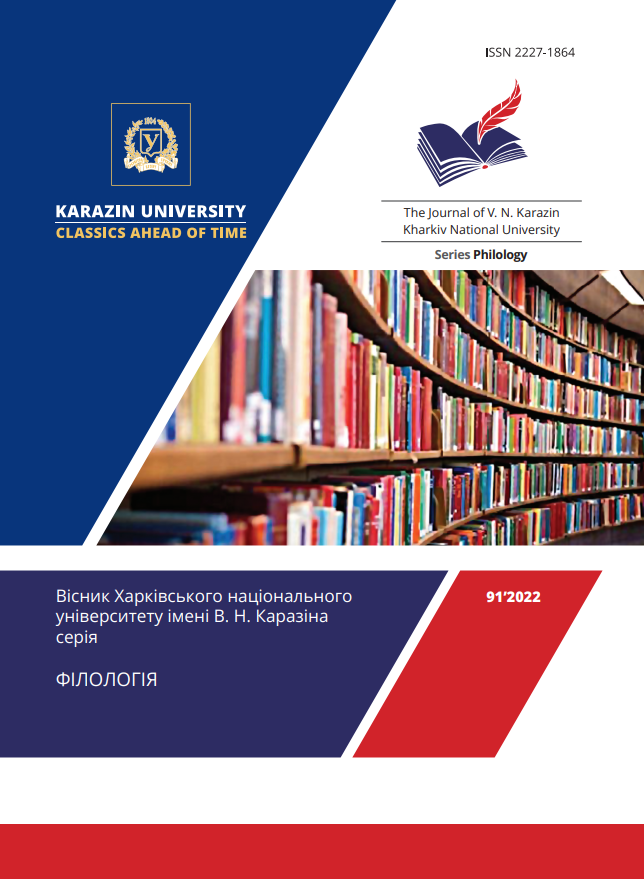Reconstruction of the figurative component and structure of the concept of fool according to the Proto-Slavic vocabulary
Abstract
From the point of view of linguistics, reconstruction of the ancient conceptions, depicted in the proto-language, allows us to reveal the evolutionary relationship between language units of a proto-language, certain language family, and certain language. Similar regularities are described by the theory of etymological (or cultural) word memory.
The named theory is sufficiently developed and well-known, but until now it has not focused attention on the connection of the first and ancient meanings of the word with conceptual semantics. The author of the article intends to investigate specified relationship and present materials on this issue in a series of publications, the first of which is this article. This determines the novelty of the proposed subject. Its relevance is determined by the original aspect of the description of the concept: the reconstruction of its figurative component and original meanings based on the materials of the Proto-Slavic vocabulary.
The purpose of the study is to reconstruct the origins of the modern concept of fool based on the data of the Proto-Slavic vocabulary.
For this purpose, the work creates a typology of the meanings of words with the root *-dur-; the structure of the concept of fools is reconstructed and compared based on the material of the Proto-Slavic vocabulary, the vocabulary of the Russian language and dialects; the etymology of the root *-dur- and the "prototypes" associated with its semantics are described; the figurative component of the concept is reproduced.
We conclude that the core meanings of the Proto-Slavic and Russian concepts of fools coincide with incompleteness. And "prototypes" that arise as a result of the etymological reconstruction of the root *dur- and the central image of the hypothetical Proto-Slavic concept are correlated, which is evidence of the regularities of meaning formation, described by the theory of the etymological memory of the word, which is revealed in the features of concept formation.
Downloads
References
Apresjan Ju. D. (1995). Izbrannye trudy. Tom II. Integral'noe opisanie jazyka i sistemnaja leksikografija [Selected works. Volume II. Integral description of the language and systematic lexicography]. Moscow: Shkola “Jazyki russkoj kul'tury”. 767 p. [in Russian].
Chernyh P. Ja. (1999). Istoriko-jetimologicheskij slovar' sovremennogo russkogo jazyka [Historico-etymological dictionary of the modern Russian language]. T. 1: A–Pantomima. Moscow: Russkij jazyk. 624 p. [in Russian].
Fasmer M. (1986). Jetimologicheskij slovar' russkogo jazyka [Etymological dictionary of the Russian language]. T. 1 (A–D). Moscow: Progress. 576 p. [in Russian].
Iakovleva E. S. (1999). O ponjatii «kul'turnaja pamjat'» v primenenii k semantike slova [On the concept of «cultural memory» as applied to the semantics of the word]. Voprosy jazykoznanija [Questions of linguistics], no 3, P. 92–107. [in Russian].
Koleva-Zlateva Zh. (2013). Jetimologicheskaja pamjat' kak vspomogatel'nyj kriterij v jetimologicheskom opyte (Zametki semanticheskoj rekonstrukcii nazvannoj pravoj storony, voshodjashhej k i.-e. *deks) [Etymological memory as an auxiliary criterion in etymological experience (Notes on the semantic reconstruction of the named right side dating back to indo-e. *deks], Slavika, XLII, pp. 149–163. [in Russian].
Preobrazhenskij A. G. (1910–1914). Jetimologicheskij slovar' russkogo jazyka [Etymological dictionary of the Russian language]. T. I (A–O). Moscow: Tipografija G. Lissnera i D. Sovko. 716 p. [in Russian].
Shust L. (2018). Zbagachennya, utochnennya y aktivіzatsіya slovnika molodshikh shkolyarіv shlyakhom yetimologіchnogo analіzu [Enrichment, refinement and activation of the vocabulary of younger pupils through etymological analysis] // Pedagogіchnii chasopis Volinі [Pedagogical journal of Volyn], no 4 (11), pp. 164–170. [in Ukranian].
Trubachev O. N. (ed.) Jetimologicheskij slovar' slavjanskih jazykov (praslavjanskij leksicheskij fond) (1974). [Etymological dictionary of Slavic languages (proto-Slavic vocabulary)]. Vypusk 1 (А – *besědьlivъ). Moscow: Nauka. 198 p. [in Russian].
Trubachev O. N. (ed.) Jetimologicheskij slovar' slavjanskih jazykov (praslavjanskij leksicheskij fond) (1978). [Etymological dictionary of Slavic languages (proto-Slavic vocabulary)]. Vypusk 5 (*dělo – *dьržьlь). Moscow: Nauka. 232 p. [in Russian].
Veremchuk E. (2020). Yetimologіchna vmotivovanіst verbalіzatorіv anglіiskomovnoї yetichnoї kategorії duty / obov’yazok [Etymological motivation of verbalizers of the English-language ethical category duty] // Lvivskiy filologichniy chasopis [Lviv Philological Magazine], No 8, pp. 34–39. [in Ukranian].
Vezhbickaja Anna (1999). Sematicheskie universalii i opisanie jazykov [Sematic universals and the description of languages]. Moscow: Jazyki russkoj kul'tury. 780 p. [in Russian].
Yefremov V., Chernyak V. D., Cherneva N. (2022). Kulturnaya pamyat i pretsedentnie fenomeni [Cultural memory and precedent phenomena // Chuzhdoezikovo obuchenie] // Чуждоезиково обучение [Foreign language training], vol. XLIX, no. 1, pp. 67–77. [in Russian].
Zahnitko A. P. (2017). Linhvokulturolohiia [Linguoculturology]. Vinnitsa: DonNU imeni Vasylia Stusa. 287 p. [in Ukranian].
Zvonska L. L., Korolova N. V., Lazer-Pankіv O. V. ta іn. Entsiklopedichnii slovnik klasichnikh mov [Encyclopedic dictionary of classical languages] (2017). Kyiv: VPTs “Kiїvskii unіversitet”. 552 с. [in Ukranian].




